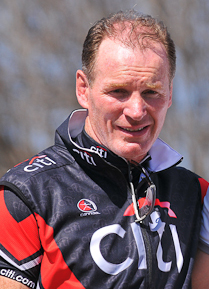
The New Zealand national rugby union team, commonly known as the All Blacks, represents New Zealand in men's international rugby union, which is considered the country's national sport. Famed for their international success, the All Blacks have often been regarded as one of the most successful sports teams in history.

The Australia men's national rugby union team, nicknamed the Wallabies, is the representative men's national team in the sport of rugby union for the nation of Australia. The team first played at Sydney in 1899, winning their first test match against the touring British Isles team.

David Ian Campese, AM, also known as Campo, is a former Australian rugby union player (1982–1996), who was capped by the Wallabies 101 times, and played 85 Tests at wing and 16 at fullback.
Michael Patrick Thomas Lynagh, is an Australian former rugby union player who played 66 Tests at fly-half and six Tests at inside centre between 1984-1995. Lynagh was capped 72 times for Australia, and was captain from 1993 to 1995.

The 1937 South Africa tour to Australasia was one of the most successful Springbok tours in history, so much so that the touring team was nicknamed the "Invincibles". The squad was captained by Philip Nel.

Simon Paul Poidevin is a former Australian rugby union player who played as a flanker. Poidevin made his Test debut for Australia against Fiji during the 1980 tour of Fiji. He was a member of the Wallabies side that defeated New Zealand 2–1 in the 1980 Bledisloe Cup series. He toured with the Eighth Wallabies for the 1984 Australia rugby union tour of Britain and Ireland that won rugby union's "grand slam", the first Australian side to defeat all four home nations, England, Ireland, Wales and Scotland, on a tour. He debuted as captain of the Wallabies in a two-Test series against Argentina in 1986, substituting for the absent Andrew Slack. He was a member of the Wallabies on the 1986 Australia rugby union tour of New Zealand that beat the All Blacks, one of six international teams and second Australian team to win a Test series in New Zealand. During the 1987 Rugby World Cup, he overtook Peter Johnson as Australia's most capped Test player against Japan, captaining the Wallabies for the third time in his 43rd cap. He captained the Wallabies on a fourth and final occasion on the 1987 Australia rugby union tour of Argentina before injury ended his tour prematurely. In 1988, he briefly retired from international rugby, reversing his decision 42 days later ahead of the 1988 Bledisloe Cup series. Following this series, Poidevin returned to the Australian side for the single 1989 Bledisloe Cup Test. He returned full-time to the Australian national squad for the 1991 season. Poidevin was a member of the Wallabies that won the 1991 Rugby World Cup, after which he retired from international rugby union.
The 2005 Tri Nations Series, an annual rugby union competition between the national teams of Australia, New Zealand and South Africa, was the tenth in the series. The competition is organised by SANZAR, a consortium of the three countries' rugby federations. This was the last year in which the Tri Nations was contested in its original double round-robin format, with each team playing the others twice.

Michael Cheika is an Australian professional dual-code rugby coach and former player who is head coach of Leicester Tigers in England's Premiership Rugby.

The first clash in Rugby Union between Australia and New Zealand took place in a test match on 15 August 1903 in Sydney, New South Wales. On that occasion, New Zealand won 22–3.
The 1924 New Zealand tour rugby to New South Wales was the 11th tour by the New Zealand national rugby union team to Australia.
The 1926 New Zealand tour rugby to New South Wales was the 13th tour by the New Zealand national rugby union team to Australia.
The 1968 New Zealand tour rugby to Australia and Fiji was the 21st tour by the New Zealand national rugby union team to Australia, concluding with a match against Fiji in Suva, Fiji.
The 1949 Australia rugby union tour of New Zealand was a series of 12 rugby union matches played by the "Wallabies" in 1949. The Australians lost only one match, and won the Test series 2-0.
The 1962 Australia rugby union tour of New Zealand was a series of thirteen matches played by the Wallabies in August and September 1962.
The 1964 Australia rugby union tour of New Zealand was a series of eight matches played by the Australia national rugby union team in August 1964.
The 1982 Australia rugby union tour of New Zealand was a series of fourteen matches played by the Australia national rugby union team in New Zealand between July and September 1982. The Wallabies won ten of the fourteen matches and lost the other four. The international match series against the New Zealand national rugby union team resulted in a 2–1 win for New Zealand, who won the first and third matches, with Australia winning the second match. New Zealand thereby regained the Bledisloe Cup, which had been held by Australia since 1979.
The 1965 South Africa rugby union tour of Australasia was a long series of matches played in 1965 by South Africa national rugby union team in Australia and New Zealand. It was not a successful tour. The Springboks lost both test matches against Australia and three of their four matches with All Blacks.
The 1986 Australia rugby union tour of New Zealand was a series of matches played by Australia national rugby union team in New Zealand between July and September 1986. Australia won the series against New Zealand with two victories in three matches.

In 1992, the South Africa Springboks played a rugby union test match against the New Zealand All Blacks, which later became known as the Return Test. The match was played at Ellis Park Stadium in Johannesburg on 15 August 1992. It was named as the Return Test as it was South Africa's first test match since the International Rugby Football Board (IRFB) had banned them due to apartheid.







